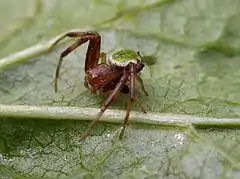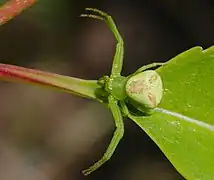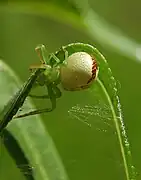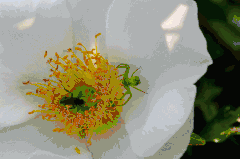| Ebrechtella tricuspidata | |
|---|---|
 | |
| Ebrechtella tricuspidata. Male | |
.JPG.webp) | |
| Female | |
| Scientific classification | |
| Domain: | Eukaryota |
| Kingdom: | Animalia |
| Phylum: | Arthropoda |
| Subphylum: | Chelicerata |
| Class: | Arachnida |
| Order: | Araneae |
| Infraorder: | Araneomorphae |
| Family: | Thomisidae |
| Genus: | Ebrechtella |
| Species: | E. tricuspidata |
| Binomial name | |
| Ebrechtella tricuspidata | |
| Synonyms | |
|
List
| |
Ebrechtella tricuspidata is a species of crab spiders belonging to the family Thomisidae. [2]
Subspecies
Subspecies include: [3]
- Ebrechtella tricuspidata tricuspidata (Fabricius, 1775) - Palearctic realm
- Ebrechtella tricuspidata concolor (Caporiacco, 1935) - Karakorum
Distribution
This species is widespread in the Palearctic realm (Europe, Turkey, Caucasus, Russia to Central Asia, China, Korea, and Japan).[4][5] It is not found in Great Britain.[6]
Habitat
These medium-sized crab spiders inhabit dry meadows and sunny forest edges, waiting for prey well camouflaged in flower and foliage. [7]
Description
Ebrechtella tricuspidata can reach approximately a body length of 5–6 millimetres (0.20–0.24 in) in females, while males are smaller, reaching a body length of 2.5–3.5 millimetres (0.098–0.138 in).[8] The cephalothorax (Prosoma) is light green in females, with sometimes indeterminate reddish markings on the back of the whitish-yellowish abdomen. These reddish markings usually consist of two broad rear-connected bands. Also legs are light green.
Males are clearly different-looking (sexual dimorphism). They have light brown cephalothorax with bright median stripe and the first two pairs of legs, while the bottle-shaped abdomen (Opisthosoma) is usually pale green, laterally with dark brown markings. [7]
Biology
Adults from both sexes can be found in May and June.
Gallery
 Male, side view
Male, side view Female, dorsal view
Female, dorsal view Female, preparing a leaf for egglaying
Female, preparing a leaf for egglaying Female, catching a fly
Female, catching a fly
References
- ↑ Fabricius, J. C. (1775) Systema entomologiae, sistens insectorum classes, ordines, genera, species, adiectis, synonymis, locis descriptionibus observationibus., Flensburg and Lipsiae, 832 pp. (Araneae, pp. 431-441).
- ↑ Catalogue of life
- ↑ Biolib
- ↑ World Spider Catalog Version 19.0
- ↑ Fauna europaea
- ↑ Spider and Harvestman Recording Scheme website
- 1 2 Spiders of Europe
- ↑ Roberts M. J. (1995): Collins Field Guide. Spiders of Britain & Northern Europe